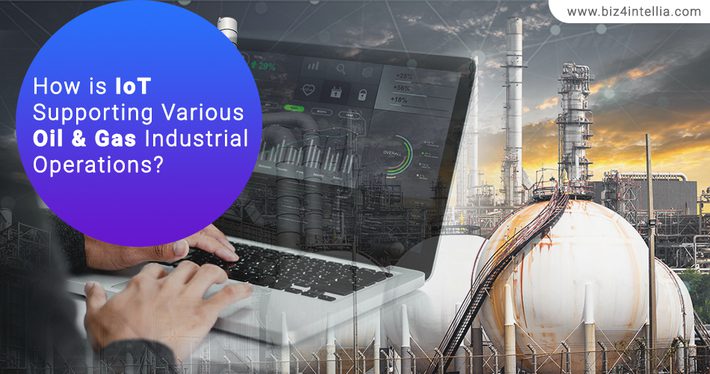The heightened technological development in the 21st century would not have been possible without the contribution from the oil & gas sector. Our dependence on the crude and its products has made it one of the industrial sectors that contribute around 2 to 3 per cent to the overall global economy. In fact, in 2017, the consumption of crude grew by 1.4 million b/d and its production increased by 2.2 million b/d.

It is surely one of the biggest sectors that is powering the global economy, albeit it is also one of the sectors that face numerous challenges. Most of these challenges negatively impact the operational efficiency of oil companies and disrupt the continuous flow of crude and petroleum products in all of its three segments.
The technology of IoT supports various industrial operations which in turn alleviate all these challenges. Let us explore every benefit that IoT offer in resolving these challenges:
1. Managing the bulk load of data:
Most oil exploration and production companies use advanced pieces of equipment like wellheads, pumpjacks, and subsea Christmas trees to extract oil from the ground and ocean floors. These equipment are a part of different service lines that span the entire cradle-to-grave lifecycle of these oil exploration companies.
These heavy machines generate a ton of data across the entire collection of service lines. For example, a single hydraulic fracturing blender (a machine that breaks rocks with the help of a pressurized liquid) can generate 22,000 signals per second. The conventional methods of storing this data include the tedious task of manual collection, inspection, and governance of visiting each and every equipment.
IoT creates a digital layer across the whole organization that allows mutual and automatic sharing of data among the machines. This IoT architecture allows companies to develop data lakes and real-time alert systems that enable the oil companies to facilitate the flow data among different endpoints and edge devices.
Implementation of IoT creates a collaborative environment that helps industries to process the data from multiple service lines and use it further to meet respective business objectives. The data gathered through various endpoints can be used to generate useful insights in the form of trends and actions.
By utilizing these insights, oil companies can make informed decisions to boost the performance of their assets and equipment, which further enhances their plants’ overall operational efficiency.
2. Oil Theft Prevention and Pipeline Monitoring:
Oil theft is one serious problem that oil refineries generally face. It not only put the economical stand of the companies in turmoil but also has severe social and environmental implications. As per an estimate, more than $133 billion worth of fuel is stolen and smuggled each year.
Supply of stolen oil supports artisanal refining that results in unregulated emission of harmful gases and sometimes is also used as a source of funding for cartels and terrorists. Other than this, oil theft often follows oil spills which deteriorate vegetation and result in brutal damage to the aquatic life.
IoT helps the industry of oil and gas to fight against oil theft and annihilate two major ways that oil robbers use to steal oil. Let us see how IoT does this:
- Pipeline Tapping and Vandalism:
Pipeline Vandalism is the most common method {especially in African countries} that thieves use to steal the oil. Robbers drill holes in the pipelines and tap them to extract the crude flowing through them. This not only causes oil spillage but can also result in unexpected blasts and fires that can affect the whole oil distribution system.
With the help of IoT infused pressure meters embedded in different sections of the pipeline network, the refineries can monitor the pressure of the crude flowing through them. The decrease in pressure meter will alert the oil refineries about potential leaks or theft allowing them to take quick actions before the thieves can get away with the stolen oil.
- Oil Tanker Management:
To transport petroleum products to petrol pumps and gas stations, oil refineries depend on fleet trucks. However, sometimes the truck drivers haul out the oil and add cheap natural oil in the tanker to compensate for the decreased weight. This severely affects the quality of fuel which can further affect the performance of the vehicles that use that fuel.
IoT fleet management solution can hence be used by the oil and gas companies to keep an eye on the fleet trucks. With the help of different sensors, parameters like weight and level of fuel in the tankers can be measured remotely.
CONCLUSION:
The sector of oil and gas is surrounded by challenges that negatively impact its operations and procedures. IoT acts as a technology enabler for the oil & gas industry that enables it to give a strategic overhaul to its operations and remotely manage various assets located in even far-off locations.
It is the best platform to manage a vast amount of data and signals emitted from multiple machines and develop useful insights from them in order to improve their overall equipment effectiveness (OEE). IoT with its remote monitoring and advanced telemetry capabilities also act as a perfect tool to track the quantity of crude and fuel distantly.
It is the best thing since sliced bread that is not only reinforcing the methodologies of the oil and gas sector but also allow its segments to collectively work towards meeting the ever-growing demand of petroleum-based products.
